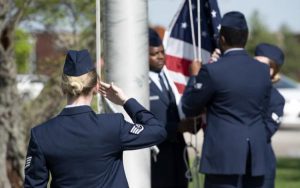I recently had the pleasure of assisting in the leadership of an event that was aimed at building community among the local population of military veterans in the Cincinnati region. The event was an absolute success, and it reinforced in me the positive and fun environment that can be found when a group of around 100 strangers with a strong common history are gathered together in one place. The shared experiences of all who attended cut through age, service history, and career differences—creating an instant level of comfort that I personally have not felt since leaving the Marine Corps in 2007.
The majority of the conversations included stories of each member’s military experiences, a lot of jokes and inter-service heckling, and ways in which the group could work to continue to build a foundation of community in our region. One of the most impactful reoccurring topics, though, was related to the prevalence of veteran suicide. According to the VA, each day over 20 veterans in the United States take their own lives. This rate is over 1.5 times that found amount the non-military community. The reality of these statistics become personal to me in the week immediately following the event, as I learned through a Marine Corps friend of mine that 2 of our brothers had taken their own lives in a one-week time span around Memorial Day 2019.

There is a great deal of published research on the underlying reasons that have created this situation. There are the obvious reasons, such as tackling the tragic realities that accompany wartime service or issues integrating back into civilian life, but a reoccurring theme among the veterans at our event was the absence of a larger mission in which to align their life and a loss of community.
Striving and working for things bigger than ourselves is a foundational pillar on which everything else in the military is built. Soldiers, Airmen, Sailors and Marines have their objective to capture and their buddies to protect, and those members in support are constantly reminded of the importance of their role to the overall strategic and tactical objectives. Unfortunately, all too often this degree of clarity and structure regarding overall mission is mostly absent in today’s civilian culture. A person must actively seek it out or define their own mission. The trouble with seeking it out is that many times mission in a civilian role is murky, superficial, and not often discussed.
Veterans make up less than 10% of the U.S. population, and while support for our service members is exceedingly high, most people in this country have only a tangential connection to individual service members and veterans, especially those who have served in our most recent conflicts. Veterans who exit the military leave behind connections that are often stronger than family. They enter a new world where the common experiences and struggles that bounded them to their military brothers and sisters are entirely foreign to their new “peers”. Worse yet, a veteran’s experiences in the military can even create an environment where non-military peers are uncomfortable in discussing a veteran’s past due to the social stigmatism that exists under the surface of the patriotism felt by all. This fact creates an environment where veterans represent a small minority in their daily work and social lives and can create the feeling of isolation.

I would like to challenge each of us to take a more active role in working to correct this trend in veterans’ suicide. I would like to encourage fellow veterans to reach out to their brother and sister veterans. Please get back in touch with them and renew those friendships that you built in your past. You will likely find that the time and distance that may have built up over the years will be lifted away like dust in a strong wind. Even this small effort may help prevent a fellow veteran from making a terrible choice. I would also like to encourage you to get involved in your local veteran, social, or faith-based organizations. This may lead to you finding a new mission for your life as well as provide a way to show others that their life can have a new mission as well.
Everyone should also know that there are resources out there for veterans who are dealing with thoughts of suicide. The Veterans Administration has a 24-hour hotline called the National Suicide Prevention Lifeline (1-800-273-8255), as well as an extensive support program that we should all encourage and politely assist veterans dealing with such issues to use. Other options include organizations like Mission 22, as well as civilian medical and mental health professionals in our local communities. Most importantly, if you know a veteran, take the time to get to know them and gently encourage them in your daily life. That simple thing might just provide the spark they need to win the battle that they are fighting within their mind and soul.


